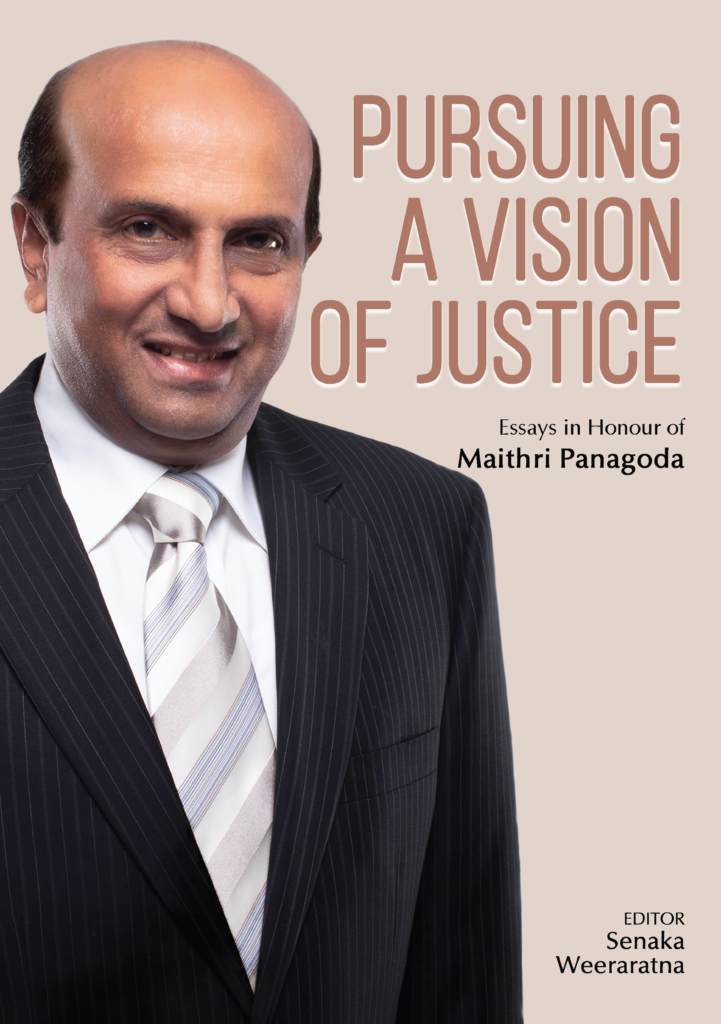A Book Review of “Pursuing a Vision of Justice”
Essays in Honour of Maithri Panagoda
Editor: Senaka Weeraratna
Vijitha Yapa Publications


Photo – Left to Right
Senaka Weeraratna, Maithri Panagoda, and Srilal Perera ( Circa 1971 – during their undergraduate days at the Colombo Law Faculty)
See the attachments (2)
Dr. Palitha Kohona, in the foreword to this voluminous, part biography, part autobiography of Maithri Panagoda edited by Senaka Weeraratna, sets quite the appropriate backdrop to assess the life and times of an extra-ordinary professional, outstanding human being, and a proud son of Sri Lanka. It is indeed challenging, as Dr. Kohona states, to review objectively when the central figure of the review happens to be one’s lifelong friend and professional colleague. There is so much more to the individual than is revealed in the book. His humility, humble nature, caring for those that are underprivileged and poor, compassion, and kindness, despite all his astounding achievements both as a successful legal professional and outstanding literary genius remain to be told. That, of course, is self-evident from him knowing his own humble nature, that he only chose to write about his life’s experiences in only one chapter of a book that has 30 chapters. Maithri’s vision of justice must be gleaned from his family life, his early and advanced education, academic and professional institutions, and his teachers, colleagues, peers, and friends who have contributed to this exhaustive volume.
Much of our lives, our convictions, and belief systems about what is right and wrong are molded around individuals who have a profound impact on our lives, from the moment of our birth into our adult lives. The autobiographical chapter “Along the Dusty Road” in many fundamental ways reflects this universal truth about the major influences on Maithri’s life, growing up. His father, a renowned Ayurvedic Physician, with a generational legacy in that form of practice, was so well respected not only because of his formidable skills dedicated to the well-being of the larger community but also because of his enormous capacity for generosity, kindness, and compassion, and yet firm and strict when needed. He later collected funds of his own to travel to Vienna, Austria (leaving behind his wife and five children) to study western medicine. That synthesis of indigenous medicine with western forms was indeed special. His mother was a simple enlightened teacher who epitomized kindness. These are quintessential qualities of parents of our generation, whose primary goal and objective were to ensure that their brood had the best education and instilled in them the value of achieving the highest academic goals, and social and survival skills in highly competitive environments. Everything was sacrificed towards enabling the children to achieve those ends. And it did not stop there. It must be passed on to the next generation and the next. That this is so evident can be concluded not only from his own description of family life so sensitively described in the book but also from the outstanding achievements of Maithri’s own children in Australia.
Clearly, in addition to the solid family foundations, educational institutions with their renowned teachers had an extraordinary impact in moulding the professional out of Maithri. Chapters 5 and 6 authored by the Editor (Senaka Weeraratna) and Chapter 7 authored by a famous son of Ananda College, Berty Wijesinghe, speak volumes about one of the finest and best Buddhist public schools in Sri Lanka and the influence that its famous teachers had not only on famous leaders of the land but on exceptionally talented students like Maithri. Ananda’s Buddhist creed devoted to the preservation of the Dhamma is well encapsulated by Sanjiva Senanayake, who cites Tarzie Vittachi, another famous product of Ananda, that “a school is part of a society’s progressive purpose…..” Maithri, as we read about him in the book, has unquestionably contributed and dedicated his adult life to the progress of society.
